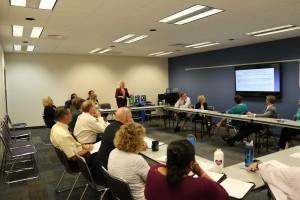Katie Kaukinen addresses a topic that makes most people uncomfortable with aplomb.
Kaukinen, associate professor, School of Public Affairs, and a criminal justice scholar, is leading training sessions for faculty, staff and students about the prevention of violence, specifically violence between intimate partners, dating violence, sexual assault and stalking.
The sessions are part of the Respect on Campus program and address new requirements outlined by the Campus Sexual Violence Elimination (SaVE) Act of 2014. The federal legislation represents a turning point in how colleges and universities will address domestic violence, dating violence, sexual assault, and stalking.
“Remember in the 70s and 80s when we used to talk about ‘no means no’ with respect to sexual violence and consent?” Kaukinen asked a group of UCCS senior administrators recently. “The standard today is affirmative consent and ‘yes means yes.’’’
The definition of consent is one facet of Kaukinen’s sexual assault prevention training. The federal government has mandated sexual assault prevention training for all university faculty, staff and students and that all employees report incidents. Kaukinen and a Respect on Campus group will deliver.
In their presentations, Kaukinen and Carrie Finkill, Respect on Campus education and victim service coordinator, review the legal requirements and tailor presentations to the needs of the audience. While the training is required, Kaukinen wants to go beyond a “check the box” mentality. She wants to prevent violence, help victims recover and empower faculty, staff and students to help.

Sessions for undergraduates for whom sexual experiences and relationships may be relatively new is detailed, explicit and relevant to the issues they face. For example, when do unwanted text messages constitute harassment or stalking? How is consent for sexual contact conveyed? What constitutes a healthy relationship? And what will happen if incidents are reported?
Incidents of interpersonal violence about college students happen on campuses across the country and under reported, Kaukinen said. About 20 percent of college women and 10 percent of men are victims of sexual violence. Another 33 percent of college students are involved in a violent intimate relationship. These experiences can lead to physical, psychological and behavioral problems that result in students failing classes or dropping out of school.
“As human beings, as faculty, we owe it to our students to be aware of the issues they may face,” Kaukinen said. “And to help them.”
For faculty and staff presentations, Kaukinen focuses on legal requirements that every campus employee – faculty, staff or student – must follow, and how to handle issues when they are brought forward.
“If a student or another employee tells you that a student has been assaulted or is a victim of domestic violence, you have to report it,” Kaukinen said. “The law is clear. There are no exceptions. If someone tells you something, even if you think they are telling you as a friend, you must report it.”
The only exception to reporting rules are conversations with a counselor. For most faculty and staff, learning that a student was a victim of domestic violence, dating violence, sexual assault or stalking should result in call to the Office of the Dean of Students, Office on Discrimination and Harassment, or the Department of Public Safety.
“Disclosures can come in many forms,” Kaukinen said. “A student may tell a faculty member during an office conversation or in a paper. It might happen at the gym or in the cafeteria. Something might be said while off-campus. It really doesn’t matter. We have an obligation to report with the goal of getting people the help they need.”
Kaukinen and her team have scheduled a number of open sessions for this education. All faculty and staff members should attend. Kaukinen and the Respect on Campus staff will also book sessions for individual departments or units.
For more information, or to schedule a presentation, contact Carrie Finkill, [email protected].
Open, one-hour SaVE trainings are scheduled
SaVE Act Training schedule
Time Date Location
4 p.m. Sept. 16. UC 302
8 p.m. Sept. 24 UC 309
3 p.m. Oct. 3 UC 302
9 a.m. Oct. 20 UC 302
9 a.m. Nov. 3 UC 302
4 p.m. Nov. 20 UC 302


Leave a Reply